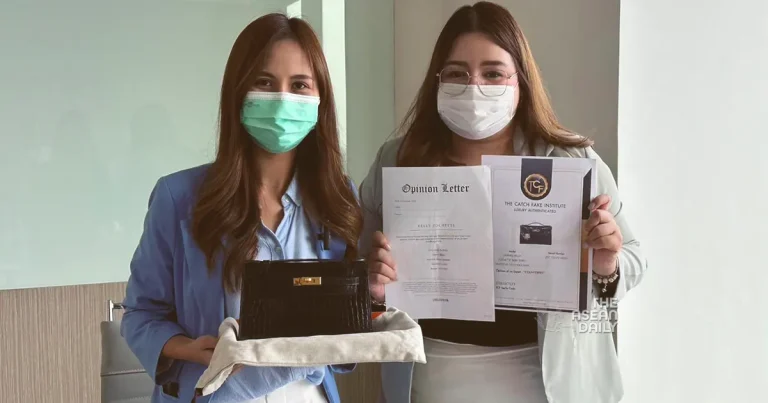13-1-2024 (BANGKOK) A tourist visiting Bangkok experienced a significant loss after purchasing what she believed to be an authentic Hermès bag from a local second-hand store. The store, however, refused to provide a full refund when the bag was later discovered to be a counterfeit. The incident has raised concerns about consumer protection and the rights of tourists in Thailand.
The tourist, identified as Ms. Deng, a 27-year-old Chinese national residing in Singapore with her husband, came across the bag through an Instagram post. Intrigued by the offer, she decided to make the purchase at a second-hand store located in Bangkok’s renowned shopping district of Ratchaprasong on October 1, 2023.
The price for the bag, which Ms. Deng believed to be an authentic Hermès Kelly Pochette Black Shiny Niloticus with gold hardware, amounted to 1.4 million baht (equivalent to approximately S$53,460.75). However, her excitement soon turned into disappointment when she sought authentication for the bag the following day.
Ms. Deng sent the bag to The Catch Fake Brandname (TCR), a Thai institute specializing in certifying luxury goods. The experts at TCR confirmed that the bag was indeed a counterfeit. It did not possess the characteristics expected of a genuine Hermès bag, as per their evaluation released on October 24. A similar Hermès Kelly Pochette Black Shiny Niloticus bag with palladium hardware was sold by luxury auction site Sotheby’s for 44,450 Swiss Francs (approximately S$69,435) in November 2023, further highlighting the vast difference in value between the authentic and counterfeit items.
Upon discovering the bag’s counterfeit status, Ms. Deng sought to return it to the store. However, the store refused to provide a full refund, claiming that the bag had already depreciated in value. Instead, they offered to repurchase the bag for 980,000 baht (approximately S$37,300), which amounted to only 70% of the original purchase price. The store justified their decision by citing “depreciation” as the reason for the reduced refund.
Feeling dissatisfied with the store’s response, Ms. Deng engaged a law firm to file a complaint with the local police on October 6. Subsequently, on November 1, the law firm representative lodged another complaint with the police. The situation took a turn when the law firm representative, accompanied by the police, visited the store. Under pressure, the store finally agreed to accept the return of the bag. However, they still insisted on providing only a partial refund of 70% of the original purchase price.
Ms. Deng, frustrated by the outcome, decided to share her story with the media on January 10. She appealed to the Thai authorities, expressing her concerns about the lack of protection for tourists’ rights and the difficulty in seeking compensation for counterfeit purchases, particularly for those with limited time in the country. She also expressed worry that such incidents might discourage other tourists from visiting Thailand.




